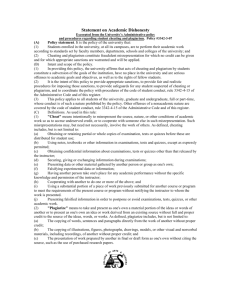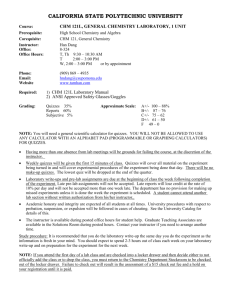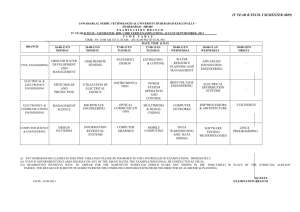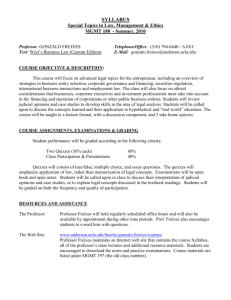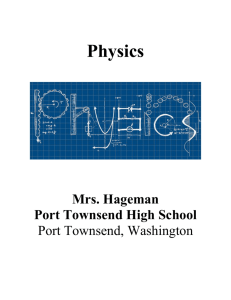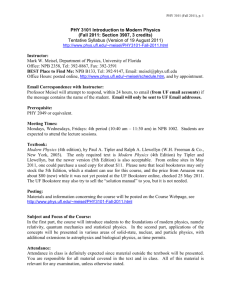Thermal Physics Fall 2001
advertisement
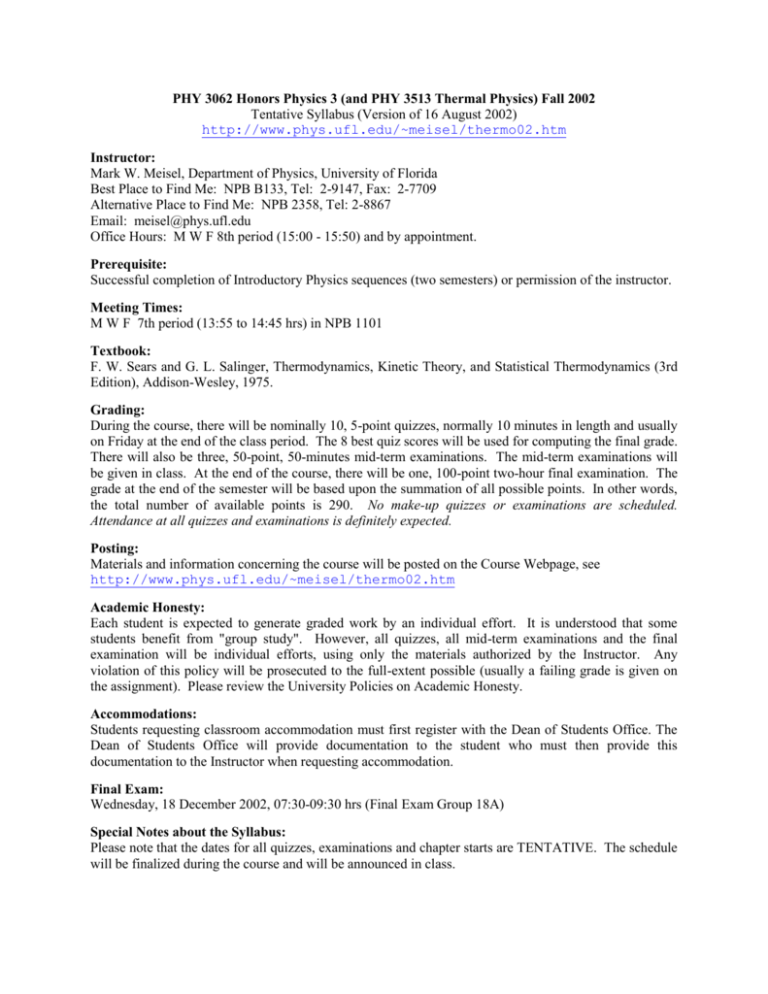
PHY 3062 Honors Physics 3 (and PHY 3513 Thermal Physics) Fall 2002 Tentative Syllabus (Version of 16 August 2002) http://www.phys.ufl.edu/~meisel/thermo02.htm Instructor: Mark W. Meisel, Department of Physics, University of Florida Best Place to Find Me: NPB B133, Tel: 2-9147, Fax: 2-7709 Alternative Place to Find Me: NPB 2358, Tel: 2-8867 Email: meisel@phys.ufl.edu Office Hours: M W F 8th period (15:00 - 15:50) and by appointment. Prerequisite: Successful completion of Introductory Physics sequences (two semesters) or permission of the instructor. Meeting Times: M W F 7th period (13:55 to 14:45 hrs) in NPB 1101 Textbook: F. W. Sears and G. L. Salinger, Thermodynamics, Kinetic Theory, and Statistical Thermodynamics (3rd Edition), Addison-Wesley, 1975. Grading: During the course, there will be nominally 10, 5-point quizzes, normally 10 minutes in length and usually on Friday at the end of the class period. The 8 best quiz scores will be used for computing the final grade. There will also be three, 50-point, 50-minutes mid-term examinations. The mid-term examinations will be given in class. At the end of the course, there will be one, 100-point two-hour final examination. The grade at the end of the semester will be based upon the summation of all possible points. In other words, the total number of available points is 290. No make-up quizzes or examinations are scheduled. Attendance at all quizzes and examinations is definitely expected. Posting: Materials and information concerning the course will be posted on the Course Webpage, see http://www.phys.ufl.edu/~meisel/thermo02.htm Academic Honesty: Each student is expected to generate graded work by an individual effort. It is understood that some students benefit from "group study". However, all quizzes, all mid-term examinations and the final examination will be individual efforts, using only the materials authorized by the Instructor. Any violation of this policy will be prosecuted to the full-extent possible (usually a failing grade is given on the assignment). Please review the University Policies on Academic Honesty. Accommodations: Students requesting classroom accommodation must first register with the Dean of Students Office. The Dean of Students Office will provide documentation to the student who must then provide this documentation to the Instructor when requesting accommodation. Final Exam: Wednesday, 18 December 2002, 07:30-09:30 hrs (Final Exam Group 18A) Special Notes about the Syllabus: Please note that the dates for all quizzes, examinations and chapter starts are TENTATIVE. The schedule will be finalized during the course and will be announced in class. PHY 3062 (and PHY 3513) Fall 2002, p. 2 Subject, Focus, and Goals of the Course: This course is a basic course in thermodynamics required for more advanced level courses but which can be treated as terminal for those who seek to understand the fundamentals of thermodynamics with an introduction to statistical mechanics. The course will begin with the definition of the thermodynamic variables (e.g. pressure, temperature) and will then treat concepts: equations of state, thermal equilibrium, the laws of thermodynamics with application to special systems including the ideal gas, the van der Waals gas, the Carnot cycle, heat engines, magnetic systems, phase transitions, and superfluids. Kinetic theory and statistical mechanics will be discussed providing and introduction for more advanced work (e.g. PHY 4523) on Maxwell-Boltzmann, Bose-Einstein, and Fermi-Dirac statistics. Students entering this course have a wide variety of backgrounds. Although quite a bit of material may seem redundant, do not be fooled or lulled into a false sense of intellectual security. The course will attempt to be self-contained and will lay the foundations of the mathematics necessary for understanding the material. If you find this material boring, please understand that its coverage is necessary for those students whose background may not be as comprehensive as your own. If at any time you are truly bored, please talk to the instructor. He can make suitable arrangements/adjustments or assign more sophisticated problems for your private consideration. The course is constructed and aimed for constant class participation. The instructor will assume that you are reading the book and working the examples and relevant problems. You are expected to maintain the pace of the course, and the quizzes and examinations are designed to help guide you in this process. Cramming before an examination will not work! Like a world-class athlete, you must train your mind to think physics, and this training should be performed EVERYDAY. Of course, you do not want to burn-out, but you must train to think like a physicist everyday. Attendance in class is definitely expected since material outside the textbook may be presented. YOU ARE RESPONSIBLE FOR ALL MATERIAL COVERED IN THE TEXT AND IN CLASS. ALL THIS MATERIAL IS RELEVANT FOR QUIZZES AND EXAMINATIONS, unless otherwise stated. The ultimate goal of the course is for the students to learn more details about thermodynamics and statistical mechanics and to be able to use the machinery of mathematics to solve general problems associated with the subject. Highly specialized problems are the subject of advanced courses in physics, chemistry, and engineering. To realize this goal, the students will not be allowed to use textbooks or notes for the quizzes or the examinations. Any specialized details, formulas or physical constant values will be provided as needed. A final word about successful completion of the course: there is no secret. If you attend class (and participate), read the textbook, and work the problems and examples, then you will learn the material. When in doubt, WORK MORE PROBLEMS! If you exhaust all problems from the textbook, see the instructor who will be happy to supply more. Remember: this stuff should be fun! If in itself it is not fun and challenging, then it should be some hoop that you are jumping so you may proceed with some fun stuff. So, you should always stay motivated to learn the material. If at any time there is a question in your mind about anything, please do not hesitate to talk to the instructor. See him immediately before or after class, if necessary, to set specific appointments. Other potentially useful books: H. B. Callen, “Thermodynamics and an Introduction to Thermostatistics”, Wiley and Sons, 1985. F. Reif, “Fundamentals of Statistical and Thermal Physics”, McGraw-Hill, 1965. R. Bowley and M. Sanchez, “Introductory Statistical Mechanics”, Clarendon Press, Oxford, 1999. A rather comprehensive listing of additional references is given at: http://stp.clarku.edu

